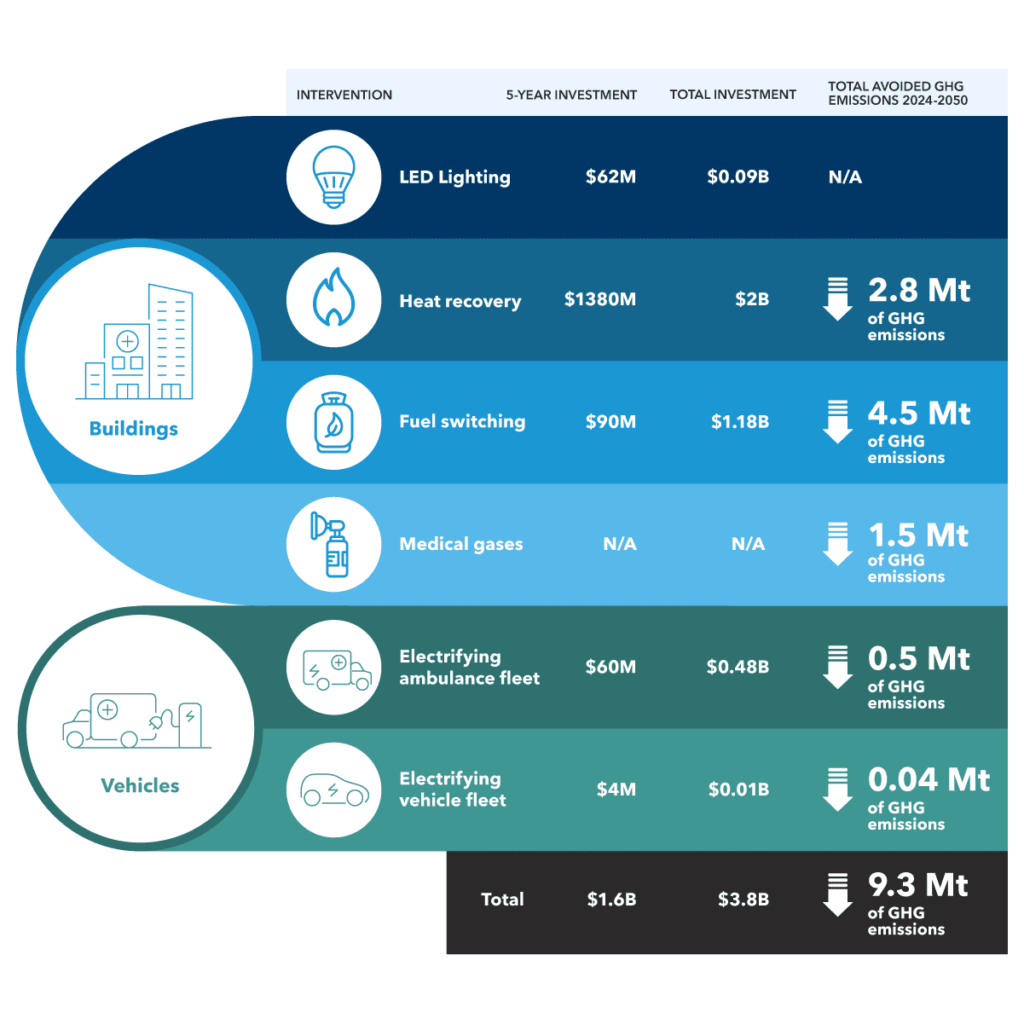Pathways to Decarbonize Quebec’s Health Care Sector by 2040

Challenge: To answer the question: how can the Quebec health care system achieve its objective of net-zero emissions by 2040?
Solution: Looking across buildings, vehicles, and indirect emissions, we developed a roadmap for how the province can achieve this goal, identifying strategies which maximize impact and minimize investment.
Impact: The report provides a solid foundation for policymakers and stakeholders for future decision-making and investment, grounded in data, sector engagement, and our team’s expertise. There is no single pathway to decarbonize this sector, yet we are confident that this report offers a robust and pragmatic approach to achieving the government’s target.
9.3Mt of GHG Reductions Achievable
Commissioned by the Quebec Association for Public Health, our report (FR only) concludes that the health care sector can achieve a net-zero building stock and vehicle fleet by 2040. This would enable total GHG emissions reductions of 9.3 Mt between 2024 and 2050. Beyond meeting the province’s GHG reduction target, the roadmap offers three additional benefits for the province such as reduced and stable energy costs for buildings, reduced maintenance for vehicle fleets, and societal health benefits associated to an emissions free environment.
To achieve these GHG reductions and benefits, our report recommends implementing key actions, including:
- Affirm the commitment of the Ministry of Health and Social Services (Ministère de la Santé et des Services Sociaux) and define the powers and mandates for action within the ministry and health care sector institutions ;
- Introduce energy efficiency measures, such as LED lighting and waste heat recovery, and substitute fossil fuels, while also ensuring efficient energy management in buildings;
- Electrify vehicles and ambulances, while optimizing the purchase of charging infrastructure and vehicle usage;
- Include indirect emissions in the calculation of carbon footprints for health care sector buildings. Assess and plan the implementation of key actions to reduce indirect emissions.

A Global Focus on Sustainability in Health Care
The report’s recommendations were developed to align with the Quebec Government’s climate targets within the health care sector and seeks to provide tangible solutions for achieving these goals.
The report also coincides with the upcoming 28th UN Conference of the Parties (COP 28) on climate, which is devoting special focus to the intersection between climate and health, and advancing resilient, equitable health care systems.
Related Projects
- Read more about A New Tool to Help Home and Business Owners Electrify Their Heating
A New Tool to Help Home and Business Owners Electrify Their Heating
May 6, 2025
Today marks the launch of Chauffermieux.com, a website aimed at homeowners, renters and business in the Greater Montréal area to…

- Read more about Utility Projects on the Go
Utility Projects on the Go
October 18, 2024
Our team is currently supporting utilities on both coasts (and others in between) with a variety of strategic initiatives. Here…

- Read more about Canada Electricity Advisory Council Delivers Final Report on Achieving Canada’s Clean Electricity Goals
Canada Electricity Advisory Council Delivers Final Report on Achieving Canada’s Clean Electricity Goals
June 17, 2024
The Canada Electricity Advisory Council (CEAC), chaired by Dunsky President Philippe Dunsky, completed its 12-month mandate to examine ways in…
